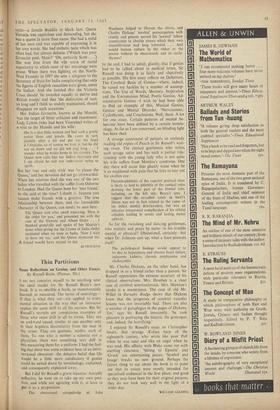Thin Partitions
Some Reflections on Genius, and Other Essays. By Russell Brain. (Pitman, 30s.) I Do not conceive myself to be anything near the ideal reader for Sir Russell Brain's new book. It is so sensible a book, so monotonously learned, so measured. The terms of neurology— if that is what they are—are applied to every mental situation in the way that an instructor applies the same drill to all his recruits. But Sir Russell's recruits are conspicuous examples of those who resist drill in all its forms. They are an awkward squad, similar to one another only in their hopeless dissimilarity from the man in the street. They are geniuses, misfits, each of them. To one who is neither a scientist nor a physician, there was something very dull in this measuring them for a uniform. I had the feel- ing that there was some evidence here of an intro- versional obsession—the delusive belief that life would be a little more satisfactory if genius could be netted down by terminology, explained, and consequently explained away.
But I did Sir Russell a grave injustice. Amiably reflective, he went on to take up my own posi- tion, and while not agreeing with it, at least to put it as a proposition.
The obsessional scrupulosity of John Woolman helped to liberate the slaves, and Charles Dickens' morbid' preoccupation with cruelty and prisons moved his 'normal' fellow countrymen to abolish abuses which their own insensitiveness had long tolerated. . . And would human culture he the richer or the poorer without its obsessionals and its cyclo- thymes?
In the end, I had to admit, glumly, that if genius had to be talked about in medical terms, Sir Russell was doing it as fairly and objectively as possible. His first essay reflects on Definition, The Cerebral Basis of Genius—where, indeed, he raised my hackles by a number of assump- tions, The • Use of Words, Memory, Inspiration and the Unconscious Mind, Poetic Genius, Ad- ministrative Genius—I wish he had been able to find an example of this, Musical Genius, Genius and Mental Disorder, 'Nervousness,' Cyclothymia, and Conclusions. Well, there. A lot for one essay. Certain patterns of mental be- haviour have been defined by a certain termin- ology. As far as 1 am concerned, no blinding light has been shed.
A strange assortment of patients sit restlessly reading old copies of Punch in Sir Russell's wait- ing room. The clerical gentleman who writes such savage satire and has such a partial rela- tionship with the young lady who is not quite his wife suffers from Meniere's syndrome. One day there will occur that ghastly scene when he is so maddened with pain that he tries to tear out his swollen eye : Thrombophlebitis of the superior petrosal sinus is likely to lead to phlebitis of the cortical veins draining the lower part of the frontal lobe, including. on the left side, Broca's area. I suggest that the so-called 'crisis' in Swift's illness was not in fact related to the cause of his initial mental deterioration, but was an infective intracranial complication of his orbital cellulitis leading to severe and lasting motor aphasia.
As for the twitching and dancing gentleman, who mutters and prays by turns—is his trouble mental or physical? Obsessional, certainly--but when Dr. Johnson cuts up, what a feast presents itself!
The pathdlogical findings would appear to be due to hyperpiesia and chronic heart failure, ischaemic kidneys, chronic emphysema and cholecystitis.
Mr. Charles Dickens, on the other hand, has dropped in as a friend rather than a patient. Sir Russell appreciates the extreme accuracy of his clinical observations. Mrs. Dombey is a clear case of cerebral arteriosclerosis. Mrs. Skewton's stroke is a masterpiece. The case of old Mr. Willet in Burnaby Rudge shows that Dickens knew that the prognosis of cerebral vascular lesions was not invariably bad. There are also a number of paraplegics in the pages of Dickens. 'for,' says Sir Russell innocently, 'he took pleasure in portraying the bizarre, the grotesque, and, indeed. the horrifying.'
I enjoyed Sir Russell's essay on Christopher mil Smart, that strange kolian harp of the eighteenth century, who wrote like poor Poll El when he was sane and like an angel when he was mad. His affinity with Blake came out with startling clearness. 'Sitting to Epstein' and 'Grock' are entertaining pieces. 'Symbol and Image' breaks no new ground. Perhaps the fairest thing to say about the book is to point • out that its essays were mostly intended for specialised audience 4 in the first place; and good as they may have been for their original purpose, they do not look very well in the light of a wider day.
WILLIAM GOLDING


































 Previous page
Previous page